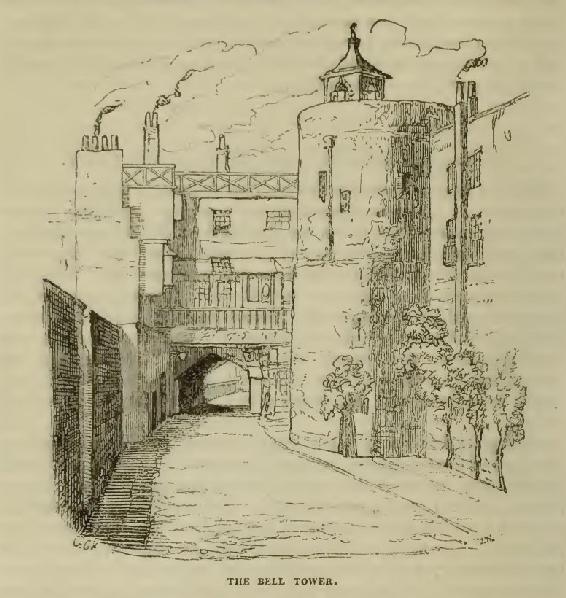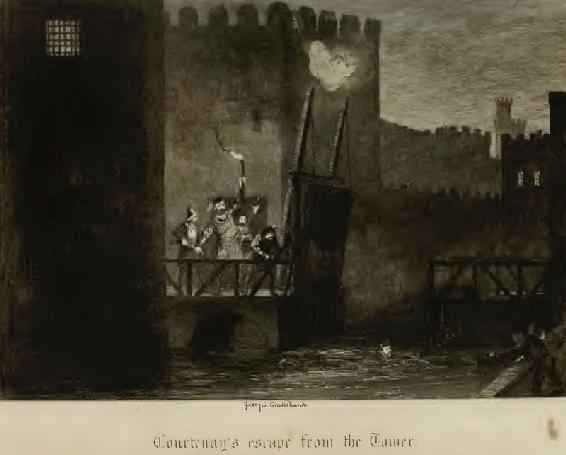
While the great outbreak was thus deferred, it was deemed expedient to liberate Courtenay as soon as possible. Such were the precautions taken by the vigilant Sir Henry Bedingfeld, that this was not so easy of accomplishment as it appeared on the onset. At length, however, all was arranged, and Xit was despatched to the earl to tell him the attempt might be made on the following night, when unluckily, just as the mannikin had entered the chimney, one of the guards awakened, and hearing a noise, flew to see what occasioned it. Exerting his utmost agility, the dwarf was soon out of reach, and the attendant could not distinguish his person, but he instantly gave the alarm.
Flying for his life, Xit got out of the chimney, hurried along the tops of the ramparts, and jumping at the hazard of his neck, into the tree, reached the ground just as the alarm was given to the sentinels. It was past midnight. But Sir Henry Bedingfeld, aroused from his couch, instantly repaired to the chamber of his prisoner. Nothing could be found but the rope by which Xit had descended, and which in his hasty retreat he had not been able to remove. Courtenay refused to answer any interrogations respecting his visiter, and after a long and fruitless search, the lieutenant departed.
The next day, the occurrence was made known to the queen, and at her request Simon Renard visited the prisoner. Not thinking his place of confinement secure enough, Renard suggested that he should be removed to the Bell Tower,—a fortification flanking the lieutenant’s habitation on the west, and deriving its name, as has already been mentioned, from the alarm-bell of the fortress, which was placed in a small wooden belfry on its roof. This tower is still in existence, and devoted to the same purpose as of old,—though its chambers, instead of being used as prison-lodgings, form the domestic offices of the governor. In shape it is circular, like all the other towers, with walls of great thickness pierced by narrow loopholes, admitting light to the interior. Courtenay was confined in a small room on the basement floor, having a vaulted roof supported by pointed arches of curious construction, with deep recesses in the intervals. From this strong and gloomy cell it seemed impossible he could escape; and having seen him placed within it, Renard departed fully satisfied.

When the intelligence of the earl’s removal was brought to De Noailles, he was greatly disheartened; but Xit bade him be of good cheer, as he still felt certain of effecting his deliverance. Some time, however, elapsed before any new scheme could be devised; when one night Xit appeared with a smiling countenance, and said he had found means of communicating with the prisoner. On being questioned as to how he had contrived this, he replied that he had crept up to a loophole opening into the earl’s chamber, and filed away one of the iron bars; and though the aperture was not large enough to allow a full-grown man to pass through it, he had done so without inconvenience, and under cover of night without being perceived. He then proceeded to detail a somewhat hazardous plan of flight, which Courtenay had determined to risk, provided his friends would second the attempt. All the earl required was, that a well-manned boat should be in waiting for him near the Tower-wharf, to put off the instant he reached it.
After some consideration, this plan was held feasible, and Sir Thomas Wyat undertook the command of the boat. A dark night being indispensable for the enterprise, the third from that time, when there would be no moon, was chosen; and this arrangement was communicated by the dwarf to Courtenay. Measures were then concerted between the earl and his assistant, and all being settled, it was agreed, to avoid heedless risk, that the latter should not return again till the appointed night.
On its arrival, Xit, as soon as it grew dark, crept through the loophole, and found the earl impatiently expecting him. He was alone, for since his removal to so strong a prison it was deemed needless to have an attendant constantly with him. Xit brought him a rapier and dagger, and a long coil of rope, and when he had armed himself with the weapons, they proceeded to the execution of their project. Knocking at the door, the earl summoned the warder who was stationed outside. The man immediately obeyed the call, and as he opened the door Xit crept behind it, and while Courtenay engaged the warder’s attention, he slipped out, and concealed himself behind a projection in the winding stairs. The earl having made a demand which he knew would compel the warder to proceed to Sir Henry Bedingfeld, dismissed him.
Quitting the cell, the warder, who had no suspicions, locked the door, leaving the key,—as had been foreseen,—within it. He then ascended the stairs, and passed close to Xit without perceiving him. As soon as he was gone, the dwarf unlocked the door, and made good his own retreat through the loophole; it being necessary he should give the signal to the party on the river.
Courtenay then hurried up the winding steps. On reaching the upper chamber, he perceived it was vacant—but the open door showed him that the warder had just passed through it. Hastily shutting it, and barring it withinside, he mounted a short flight of steps leading to the roof, where he knew a sentinel who had charge of the alarm-bell was stationed. Before the man, who was leaning upon his partizan, could utter an exclamation, Courtenay snatched the weapon from him, and dealt him a blow that stretched him senseless at his feet. He then quickly fastened the rope to one of the stout wooden supporters of the belfry, and flinging the coil over the battlements, prepared to descend by it.
Possessed of great strength and activity, and materially aided by the roughened surface of the old walls, and other irregularities in the structure, against which he placed his feet, the earl reached the ground in safety. He was now in the outer ward, near the By-ward Tower. It was so dark that his descent had not been noticed, but he perceived several soldiers passing at a little distance from him, from whose remarks he gathered that they were about to convey the keys of the fortress to the lieutenant.
As soon as they had passed him, he rushed across the ward in the direction of the arched passage leading to the drawbridge. Here he encountered Og, who was on guard at the time. The gigantic warder immediately challenged him, and presented his huge halbert at his breast. But the earl, without making any reply, stooped down, and before he could be prevented, darted through his legs. Og, in a voice of thunder, gave the alarm, and was instantly answered by a party of halberdiers, who rushed out of the adjoining guard-room. They were all armed, some with pikes, some with arquebusses, and snatching a torch from the soldier nearest him, Og darted after the fugitive.
By this time, the earl’s flight from the Bell Tower had been discovered. On his return, finding the door barred withinside, the warder suspected something wrong, and gave the alarm. A few seconds sufficed to the men-at-arms to break down the door with their bills, and they then found what had occurred. The alarm-bell was instantly rung, and word passed to the sentinels on the By-ward Tower, and on the other fortifications, that the Earl of Devonshire had escaped. In an instant, all was in motion. Torches gleamed along the whole line of ramparts; shouts were heard in every direction; and soldiers hastened to each point whence it was conceived likely he would attempt to break forth.
Before relating the result of the attempt, it may be proper to advert to what had been done in furtherance of it by Xit. Having got through the loophole as before related, the dwarf pursued the course subsequently taken by Courtenay, made a hasty excuse to Og, and crossed the drawbridge just before it was raised. Approaching the side of the river, he drew a petronel, and flashing it, the signal was immediately answered by the sound of muffled oars; and Xit, whose gaze was steadfastly bent upon the stream, could just detect a boat approaching the strand. The next moment, Sir Thomas Wyat sprang ashore, and as Xit was explaining to him in a whisper what had occurred, the alarm was given as above related.
It was a moment of intense interest to all concerned in the enterprise, and Wyat held himself in readiness for action. On reaching the drawbridge and finding it raised, Courtenay without hesitation bounded over the rails, and plunging into the moat, struck out towards the opposite bank.

At this juncture, Og and his companions arrived at the outlet. The giant held his torch over the moat, and perceived the earl swimming across it. A soldier beside him levelled his arquebuss at the fugitive, and would have fired, but Og checked him, crying, “Beware how you harm the queen’s favourite. It is the Earl of Devonshire. Seize him, but injure him not—or dread her majesty’s displeasure.”
The caution, however, was unheeded by those on the summit of the By-ward Tower. Shots were fired from it, and the balls speckled the surface of the water, but without doing any damage. One of Wyat’s crew hastened to the edge of the moat, and throwing a short line into the water, assisted the earl to land.
While this was passing, the drawbridge was lowered, and Og and his companions rushed across it—too late, however, to secure the fugitive. As soon as Courtenay had gained a footing on the wharf, Sir Thomas Wyat seized his hand, and hurried him towards the boat, into which they leaped. The oars were then plunged into the water, and before their pursuers gained the bank, the skiff had shot to some distance from it. Another boat was instantly manned and gave chase, but without effect. The obscurity favoured the fugitives. Wyat directed his men to pull towards London Bridge, and they soon disappeared beneath its narrow arches.